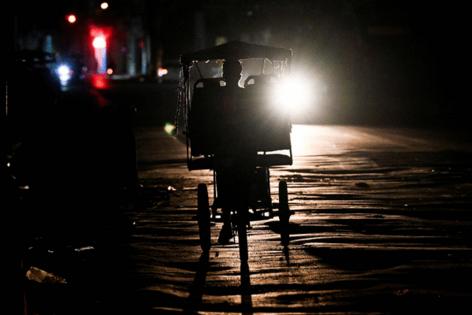Commentary: Cuba's blackouts -- Why central planners can't create reliable power
Published in Op Eds
Cuba went dark on Dec. 4 as the Antonio Guiteras Thermoelectric Plant east of Havana malfunctioned. This follows a series of blackouts over the past two months, ranging from total to intermittent. Communist leaders may be powerful, but they can’t produce reliable power.
After Cuba’s electrical grid suffered a total collapse in mid-October, and the entire island was left without electricity, Cuba’s President Miguel Díaz-Canel accused the United States of causing the blackouts and ensuing chaos. He spoke of the U.S. trade embargo as an “economic war” which has led to the suffering of millions of Cubans from their restrictive policies.
The U.S. trade embargo undoubtedly affected the flow of goods into Cuba, but for the government to tie it to the health of the power grid is nothing more than a ploy to avoid responsibility.
The island’s blackouts are rooted in 50 years of policy failures created by a communist economy, with central planning substituting for the provisions of goods by private companies in response to price signals. Central planners clearly cannot produce reliable, resilient electricity, which is the foundation of any economy.
Cuba boasts about the quality of its medical care, but hospitals rely on electricity. Electricity provides refrigeration and hot showers for homes, and power to process its valuable exports in tobacco, sugar, and nickel.
Cuba relies almost entirely on imported oil and natural gas for electricity. Cubans consume 153,000 barrels per day, and of that, only a little under 50,000 barrels are produced domestically. This leaves a gap of over 105,000 barrels to meet demand.
Cuba has historically imported most of its oil from its longtime ally and oil producer Venezuela. With the highest proven oil reserves in the world, Venezuela once provided Cuba with a cheap, abundant, and reliable fuel supply. Unfortunately, Venezuela’s economic problems have stalled its own production to the point where it is no longer in the top 10 oil producing countries and it can no longer supply Cuba.
Cuba has turned to other sources to compensate for the Venezuelan production decline. Russia has filled this gap, exporting to Cuba 30,000 of the 80,000 barrels a day Cuba once received from Venezuela. But Russian imports have been irregular and unreliable — a much-needed Russian oil shipment arrived in March 2024 after a year-long wait.
Even if a consistent supply of oil alleviated the scarcity experienced by Cubans, it would not address the full problem. That lies in Cuba’s energy industry itself, and no amount of oil shipments will fix it. In October, Cuba demonstrated that it couldn’t effectively use an emergency shipment of 500,000 barrels from Mexico. Even with the aid, the Cuban government announced, blackouts will continue to occur, even during peak hours.
Like many industries in Cuba, electricity is subject to government central planning. Under this system, there is no incentive for competition between private electricity generators. Instead, an already cash-constrained government allocates a fixed amount of resources to electricity production, leaving no option for extra investment into the industry.
This lack of investment has left the island’s electricity sector packed with power plants overdue for maintenance, setting the conditions for even greater future power failures. Cuba will then be forced to divert its already scarce resources toward disaster relief.
This will amplify the vicious cycle where immediate crises are prioritized over long-term investment in the power industry, leading to continued neglect and further failures.
Cuba’s blackouts serve as a warning about the limitations and dangers of a centrally planned economy, which breeds economic inefficiency and improperly allocated resources. The only solution is significant reform. Reforms would ensure that investment flows to critical economic sectors and would allow Cuba to catch up with its neighbors.
While central planning may appear to offer the prospect of economic prosperity, the recent blackouts demonstrate once again to Cubans — and the world — its failure to produce the foundations of a functioning economy.
____
Diana Furchtgott-Roth directs the Center for Energy, Climate and Environment at The Heritage Foundation, where Scott Rupert is a member of the Young Leaders Program.
_____
©2024 Tribune Content Agency, LLC.




























































Comments